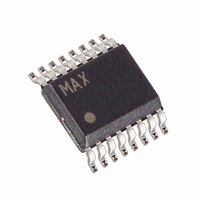MAX8505EEE+ Maxim Integrated Products, MAX8505EEE+ Datasheet - Page 11

MAX8505EEE+
Manufacturer Part Number
MAX8505EEE+
Description
IC REG STP DWN 3A 16-QSOP
Manufacturer
Maxim Integrated Products
Type
Step-Down (Buck)r
Datasheet
1.MAX8505EEE.pdf
(15 pages)
Specifications of MAX8505EEE+
Internal Switch(s)
Yes
Synchronous Rectifier
Yes
Number Of Outputs
1
Voltage - Output
0.8 ~ 4.68 V
Current - Output
3A
Frequency - Switching
500kHz, 1MHz
Voltage - Input
2.6 ~ 5.5 V
Operating Temperature
-40°C ~ 85°C
Mounting Type
Surface Mount
Package / Case
16-QSOP
Power - Output
1W
Input Voltage
2.6 V to 5.5 V
Supply Current
6 mA
Maximum Operating Temperature
+ 85 C
Minimum Operating Temperature
- 40 C
Lead Free Status / RoHS Status
Lead free / RoHS Compliant
The output voltage of the MAX8505 can be adjusted
from 0.8V to 85% of the input voltage at 500kHz or up
to 80% of the input voltage at 1MHz. This is done by
connecting a resistive-divider (R2 and R3) between the
output and the FB pin (see the Typical Operating
Circuit ). For best results, keep R3 below 50kΩ and
select R2 using the following equation:
where V
When choosing the inductor, the key parameters are
inductor value (L) and peak current (I
following equation includes a constant, denoted as LIR,
which is the ratio of peak-to-peak inductor AC current
(ripple current) to maximum DC load current. A higher
value of LIR allows smaller inductance but results in
higher losses and ripple. A good compromise between
size and losses is found at approximately 20% to 30%
ripple-current to load-current ratio (LIR = 0.20 to 0.30):
where f
Choose an inductor with a saturation current at least as
high as the peak inductor current. Additionally, verify
the peak inductor current does not exceed the current
limit. The inductor selected should exhibit low losses at
the chosen operating frequency.
The key selection parameters for the output capacitor
are capacitance, ESR, ESL, and the voltage rating
requirements. These affect the overall stability, output
ripple voltage, and transient response of the DC-DC
converter. The output ripple occurs due to variations in
the charge stored in the output capacitor, the voltage
drop due to the capacitor’s ESR, and the voltage drop
due to the capacitor’s ESL. Calculate the output voltage
ripple due to the output capacitance, ESR, and ESL as:
S
REF
is the switching frequency and
Output Capacitor Design and Output Ripple
= 0.8V.
R
LIR
L
2
______________________________________________________________________________________
=
=
3A, 1MHz, 1% Accurate, Internal Switch
= ×
R
I
V
OUT
2
3
OUT
Output Voltage Selection
×
⎛
⎜
⎝
(
I
×
PEAK
V
V
×
Step-Down Regulator with Power-OK
OUT
LIR f
REF
(
I
1
OUT
−
×
−
−
D
I
S
OUT
1
)
⎞
⎟
⎠
Inductor Design
)
PEAK
). The
where the output ripples due to output capacitance,
ESR, and ESL are:
or, whichever is greater.
The ESR is the main contribution to the output voltage
ripple.
I
Use these equations for initial capacitor selection,
but determine final values by testing a prototype or
evaluation circuit. As a rule, a smaller ripple current
results in less output voltage ripple. Since the inductor
ripple current is a factor of the inductor value, the
output voltage ripple decreases with larger inductance.
Use ceramic capacitors for their low ESR and ESL at the
switching frequency of the converter. The low ESL of
ceramic capacitors makes ripple voltages negligible.
Load-transient response depends on the selected
output capacitor. During a load transient, the output
instantly changes by ESR
can respond, the output deviates further, depending on
the inductor and output capacitor values. After a short
time (see Transient Response in the Typical Operating
Characteristics ), the controller responds by regulating the
output voltage back to its nominal state. The controller
response time depends on the closed-loop bandwidth,
the inductor value, and the slew rate of the transconduc-
tance amplifier. A higher bandwidth yields a faster
response time, thus preventing the output from deviating
further from its regulating value.
V
P-P
RIPPLE
, the peak-to-peak inductor current, is:
V
RIPPLE ESL
=
V
V
RIPPLE C
I
RIPPLE C
P P
V
(
−
RIPPLE ESR
=
)
( )
=
( )
(
V
I
(
IN
2
P P
t
ON
=
−
f
+
S
−
V
8
×
)
V
RIPPLE ESR
×
×
OUT
=
L
I
ESL or
C
LOAD
I
P P
I
P P
OUT
−
)
−
(
×
×
. Before the controller
ESR
×
V
OUT
V
f
)
IN
S
I
t
2
P P
OFF
+
−
V
RIPPLE ESL
×
ESL
,
(
)
11
2







